GLOK, Ride, Mantra Of The Cosmos, Oasis, releasing under his own name, collaborations galore… Andy Bell is a busy, prolific and ultimately happy man. Music, he says, has given him everything. Following the release of his third solo album under his own name he tells Jim Butler why its title, ‘pinball wanderer’ is apt: “It’s a very comfortable way for me to live my life, bouncing around from this to that…”
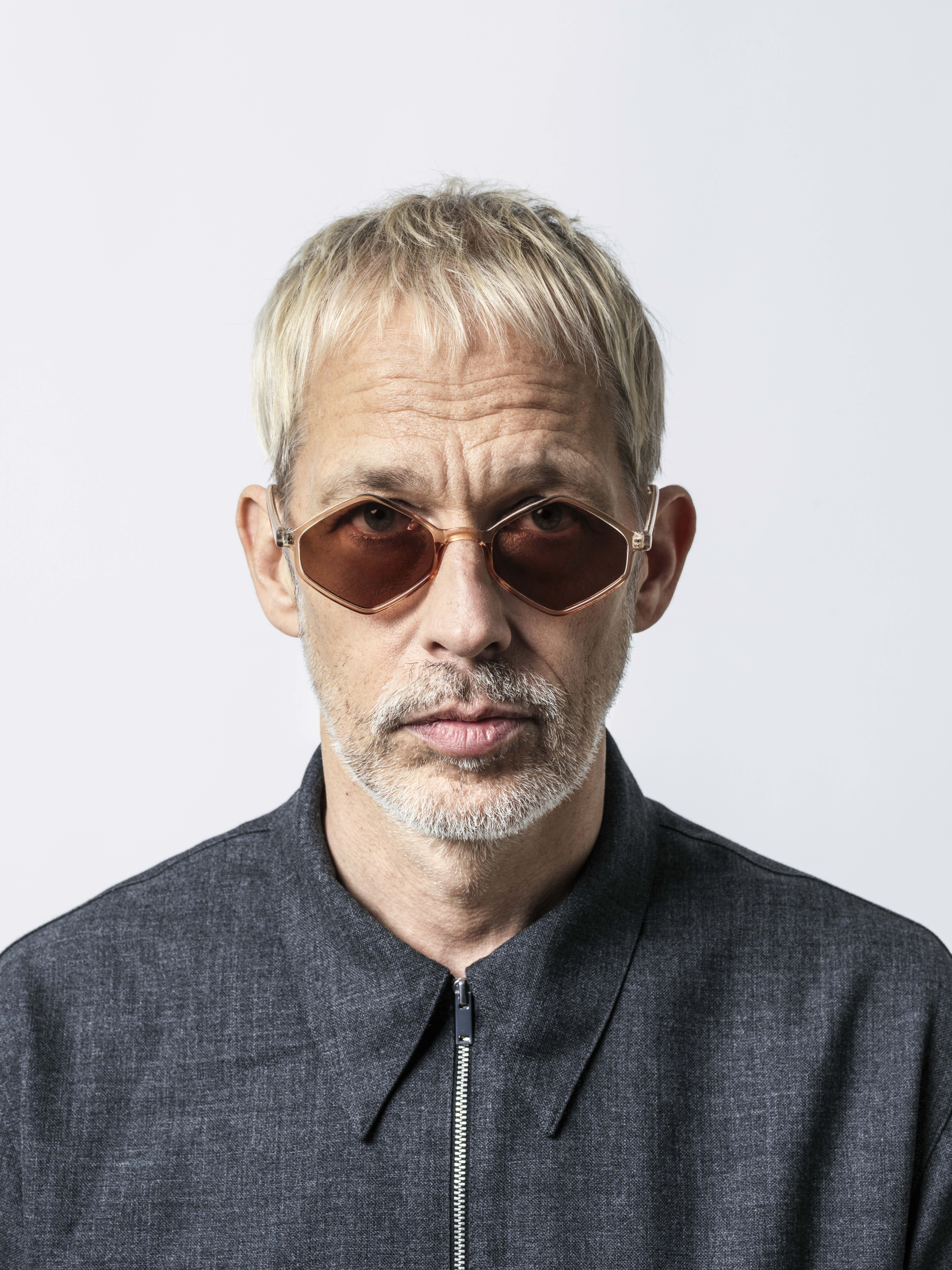
Andy Bell likes trying new things. This morning, he attended his first tai chi class. Sitting in one of his favourite north London boozers, The Compton Arms – reputedly the inspiration for George Orwell’s celebrated essay about the perfect pub, The Moon Under Water – not far from his beloved Arsenal and it appears he thoroughly enjoyed his inaugural brush with the ancient Chinese martial art.
“I didn’t know what to expect,” he says in his softly effusive manner. “It was great. I also enjoyed being one of the youngest there!”
Over the last decade this willingness to push himself out of his comfort zone has led to a sustained bout of prolificity. Alongside the three albums and numerous tours undertaken with his nominal day job as one of the vocalists and guitarist in Ride, the fêted band he formed with his school friend Mark Gardner in Oxford in the late-80s; he’s released three solo albums under his own name, a collaborative improvisational piece with the modular synth and harp duo, Masal, another three albums under his electronic alter-ego GLOK and joined the intermittent psychedelic supergroup Mantra Of The Cosmos with Shaun Ryder, Bez and Zak Starkey.
“I spent a long time not doing it,” Bell offers, in-between sips of his soft drink. “Just being in bands. All the time I was doing that I was slowly building up a hidden catalogue. There was this huge unreleased pile of potentially good music that wasn’t really suitable for any of the bands that I played in.”
The twin spectres of David Bowie’s death in 2016, followed by Covid in 2020, provided Bell with both an inspirational and practical push respectively. His aural accumulation began in the wake of The Thin White Duke’s death following a chat with his former Oasis and Beady Eye bandmate and one of his best friends, Gem Archer, about the number of songs he’d started. Archer invited Bell down to his studio and they worked on tracks, which were then left to marinate. When Covid hit, Bell finally had the opportunity to get into the songs “in-between home schooling the kids and doomscrolling”.
The year before the pandemic, Bell had begun his initial, furtive, solo journey with the release of a two-track single for Nat Cramp’s Sonic Cathedral Singles Club. Although it was designed as a one-off release, Bell realised he had to follow it up. “I couldn’t just do a single and leave it. That’s just not how it works, in my head.” Delving back into the Archer sessions he began to pull tracks out for a 12-inch, the problem was he had too many songs for an EP.
“Compiling is very important to me,” he says. “I’ve always liked EPs and groups of four. I had these two alternate sets of four songs that I couldn’t get my head around. I didn’t want it to be a full instrumental EP, but I wanted some instrumental energy in there.”
The compromise? An eight-track album, ‘The View From Halfway Down’. “I released the first track on my 50th birthday, hoping that I’ll live to be 100,” he smiles, knocking theatrically on a wooden table. The follow-up, ‘Flicker’, was released the following year in 2021, as a double album, those original Archer recordings proving to be a bountiful source of sonic stimulation.
“What I’m trying to get across is it was easy,” he reflects. “It was pulling into tracks that had already been done. Finishing them off – sometimes quite radically changing them, but always in mind that you’re filling either two sides or four sides of vinyl.”
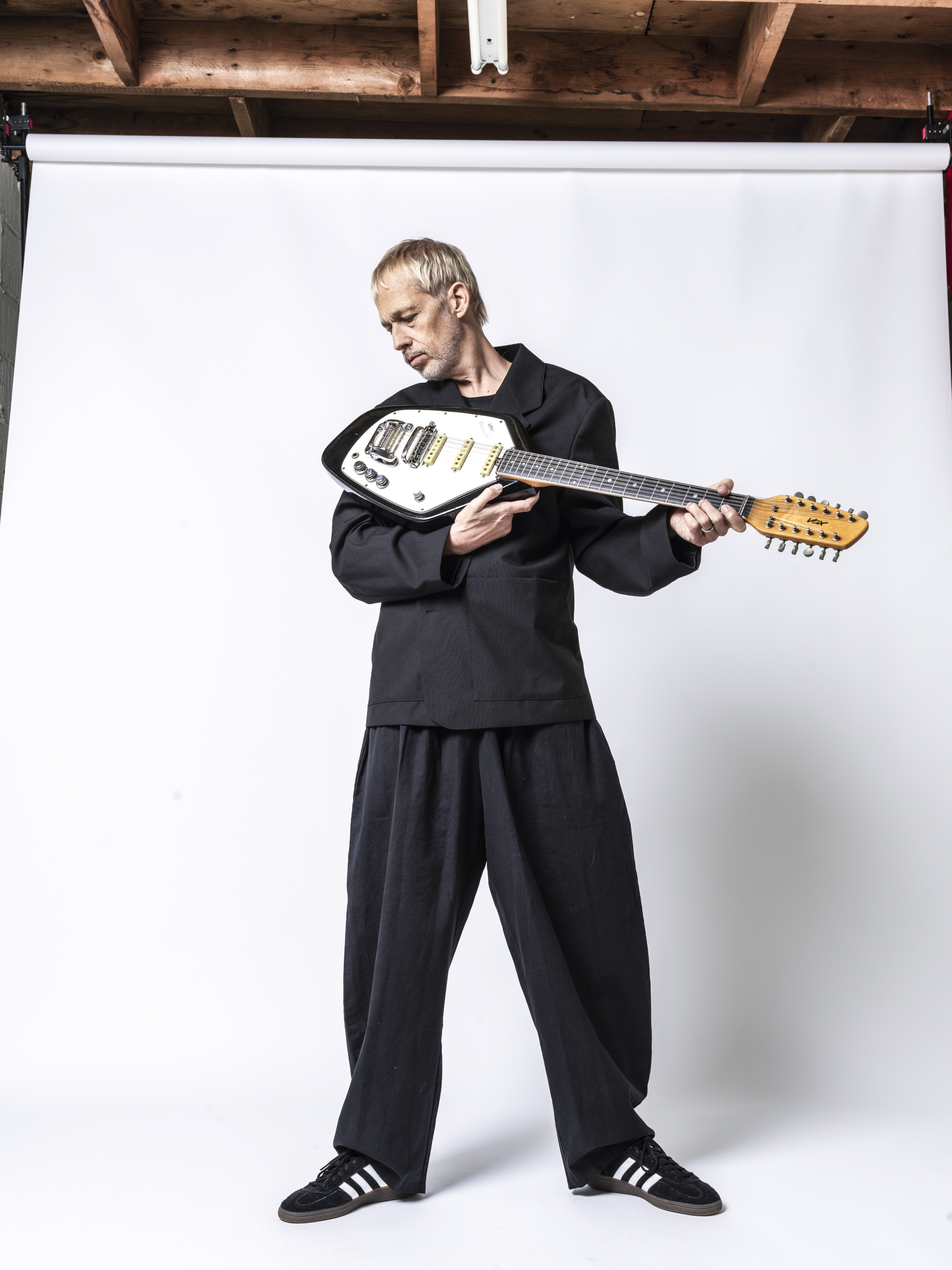
Running parallel to the work released under his own name – ostensibly an infectious blend of ethereal shoegaze-cum-psychedelic folk rock, Arthur Russell, The Byrds and Cocteau Twins all being gently shifting touchpoints – were his cosmic electronic outings as GLOK. These were initially born out of a desire to become a film composer. He began feeding work to a label on a casual deal, however, apprehensive about using his own name he opted for GLOK, the German for bell. “I wanted to use the Russian for bell, Kolokol, which I love,” he explains. “But it’s also slang for one of the poisons they use in assassinations.” He’d eventually use ‘Kolokol’ for a track on the first GLOK album.
Despite a bewildering lack of interest from the film world, word began to spread among the electronic community that Andy Bell, erstwhile bassist with Oasis (will he return this year? There’s still no official announcement), was concocting all manner of dancefloor-adjacent experiments. The Bytes label released the first two GLOK albums in 2019 and 2021. Both ‘Dissident’ and ‘Pattern Recognition’ kick off with two 19-minute mind-altering bangers: ‘Dissident’’s title track is a pulsating dive into cinematic Italo disco, while ‘Dirty Hugs’ is an ultra-infectious elephantine freak out. Mr Fingers-like acid symphonies lace both releases.
All of which is a very long way of asking how does Andy Bell sleep? Well, if his latest album, ‘pinball wanderer’, is anything to go by, he doesn’t. He finishes off albums when he should be tucked up in bed. Last July, the night before he was due to fly to the other side of the world for a Ride tour, he decided to mix the track that would be the first single from ‘pinball wanderer’. A cover of The Passions’ ‘I’m in Love With a German Film Star’, featuring vocals from kindred spirit Dot Allison, it was due to be remixed by Neu!’s Michael Rother. However, rather than give it a Krautrock-endorsed makeover, Rother sent Bell some guitar parts, telling him to use them how he saw fit.
“This was a thousand times more than I expected,” Bell recalls. “A remix would have been cool but having him play guitar… And when I heard them it was prime Neu!. So, I slotted them into the mix.”
Bell was now buzzing. It was close to midnight and a cab was picking him up at 7am. Inspired, he worked on some more tracks. By two in the morning, he’d mixed half the album. “I hadn’t decided at that point what the final eight tracks were, because I’d made 11 or 12. I just thought: ‘Fuck it, I’m going to do it.’ I was going somewhere where the best thing to do on the plane was sleep, so the best thing I could do was stay up. I made a coffee and I was in. All the vocals on the last track were done at three in the morning. I tranced out completely.”
‘pinball wanderer’ – the title comes from a nickname he gave himself (“I do seem to ricochet around from thing to thing. It’s a very comfortable way for me to live my life, bouncing around from this to that”) – is an idyllic listen. Inspired by the opening bass and drums production sound on Serge Gainsbourg’s ‘Melody Nelson’, it veers from gossamer-light melodic psychedelia to Balearic dream pop. The sound world Bell effortlessly creates touches upon determinedly British guitar/electronic auteurs like Vini Reilly and Mark Peters, but also brings to mind the textured vistas created by American instrumentalist/composer Raymond Richards and the wonderfully-titled Nashville Ambient Ensemble. There’s a pleasing sun-dappled folktronica to the album. “It’s a kind of quite lightweight record,” Bell demurs modestly – and unnecessarily. “The lyrics are quite silly. There’s not many lyrics on it.”
When pressed as to where the record fits, or where the best time or place to listen to the album is, he’s more forthcoming. “It’s shoegaze barbecue music,” he laughs. “For the first record we were going to do that, have a barbecue. Mac DeMarco did it. He’s great. He’s someone listening to his records and seeing how prolific he is, who’s an inspiration when it comes to my stuff. He had a barbecue at his house and that led us to shoegaze barbecue. It never happened… lockdown. I think there was a playlist. Maybe this summer.”
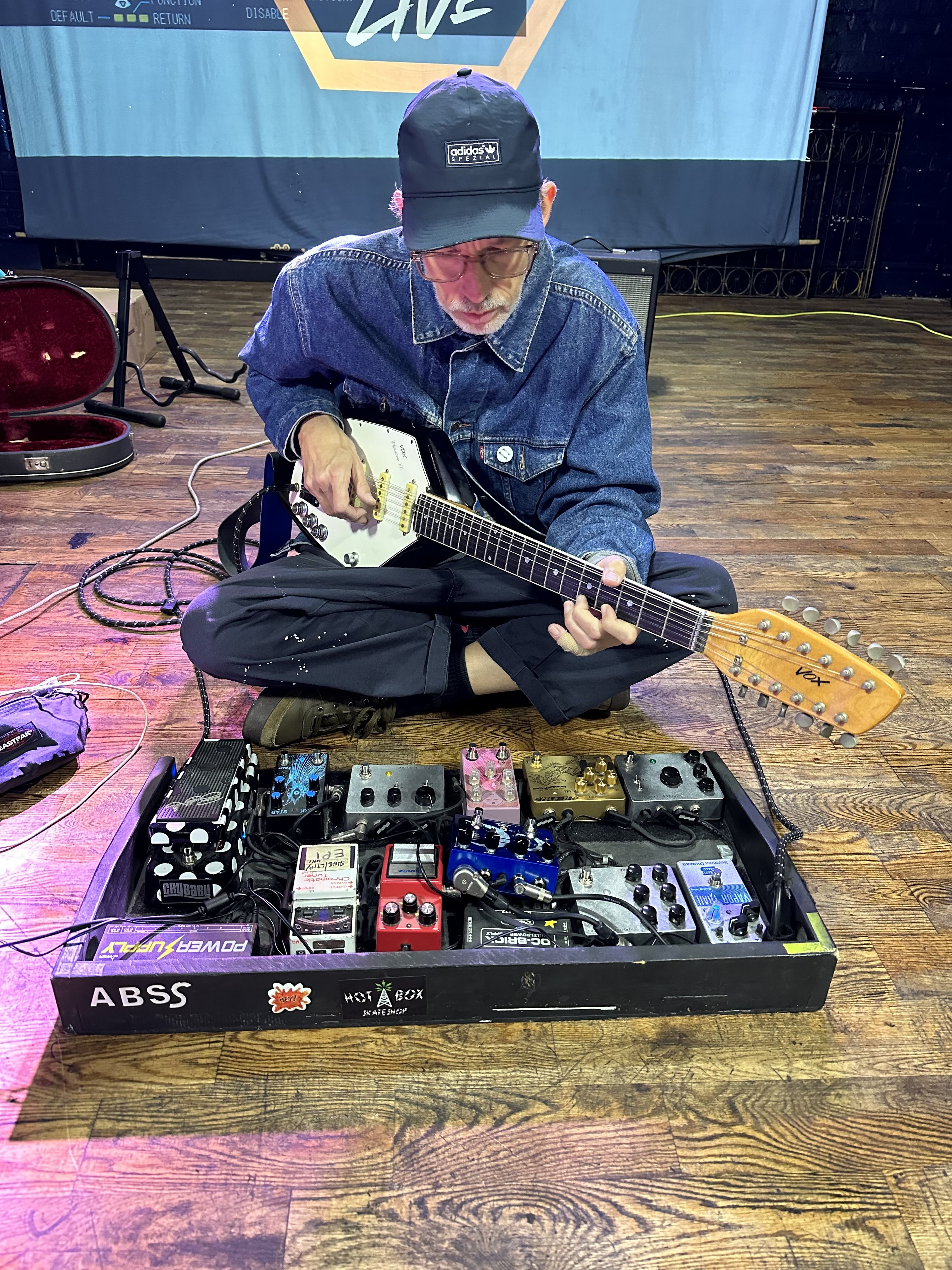
It will come as no surprise to discover that Andy Bell is something of an arch theorist. He loves ideas. “I’m the sort of person who loves to sit around and conceptualise a record before making it. If we were in a band we’d be talking about how it would be really cool to do an album like this and we could wear that. You dream the whole thing up. And then you try and do it. That’s something that does really drive me. The idea of doing something in a certain way.”
But equally, the ideas can evolve, the direction can change. “Often when you’re doing that you forget why you were doing it. Or you get distracted and it changes. And that’s just as good really.”
To help keep some sort of distinction between his various musical worlds, he has guitars that he uses for each project and “bits of equipment that are particular to that world”. But, as he says, those two worlds are increasingly blurring. GLOK began as a purely instrumental outlet. On ‘Pattern Recognition’, however, he started to work with singers and “began to break all my own rules. Just for fun really”.
Indeed ‘pinball wanderer’ and ‘Alliance’, the collaborative GLOK album he released with Timothy Clerkin at the end of last year, certainly have some pleasing overlaps. You’d be hard pushed to describe ‘pinball wanderer’ as a dance record, but there are hints of producers like Koushik and Bibio, as well as forward-thinking outfits like The Beta Band.
“I don’t agree,” he says when its put to him ‘pinball wanderer’ shares qualities with GLOK. “It’s a rock record. Just a minimal one. Because the drums and bass are exposed people seem to hear it as more electronic. There is a little bit of synth on it. I mean I’m not upset by that. I’m interested by it more than anything. Maybe the lines are all blurring and maybe there won’t be a need to do another GLOK record if it’s all incorporated into the one thing.”
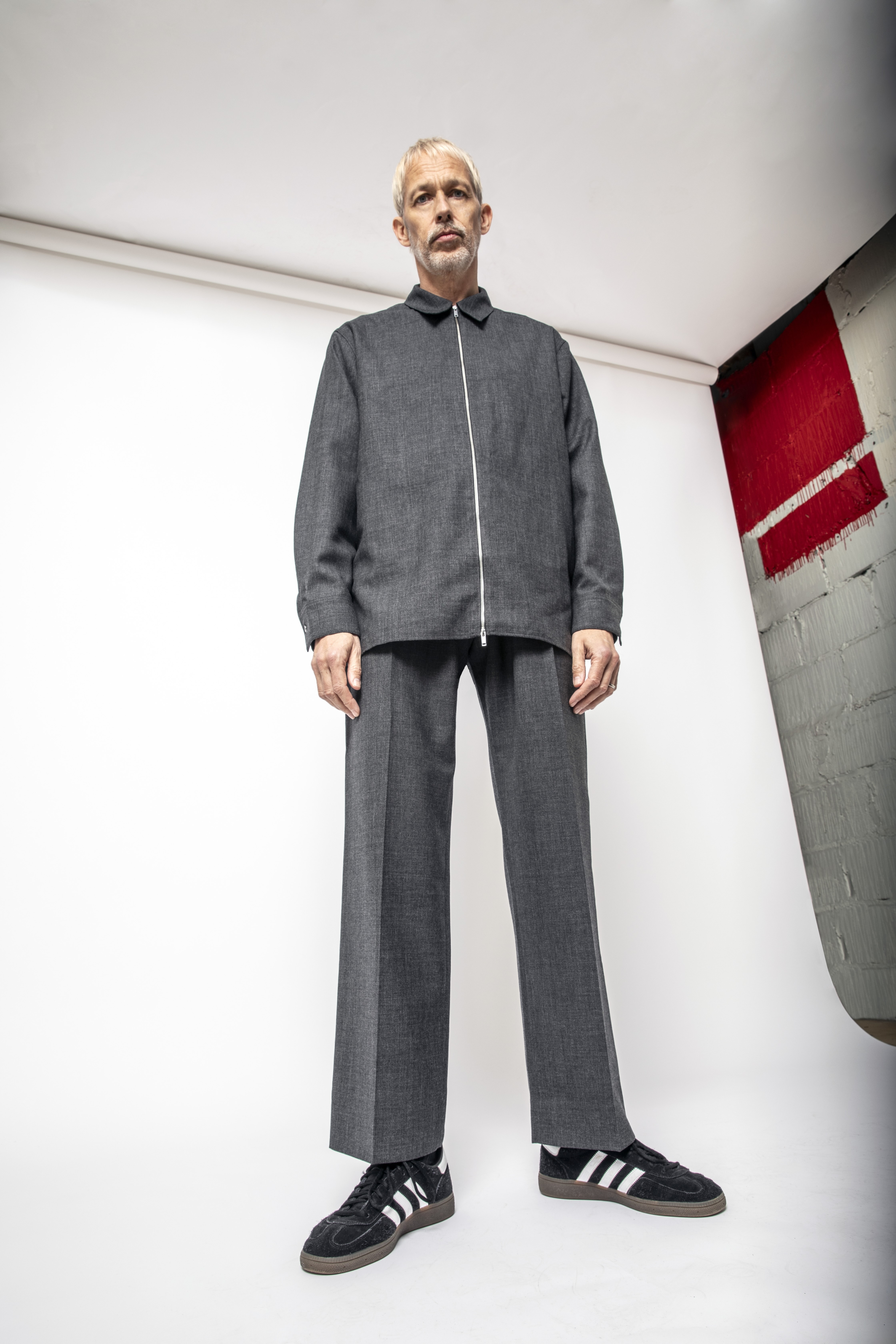
The push and pull of the dance/electronic world has always been hovering around Bell, even if it wasn’t always in focus. He talks of an older friend taping him Mr Fingers and Can records when he was just starting out in Ride and he remembers buying ‘Voodoo Ray’ on 12-inch, as well as Bobby Byrd and James Brown records that paved the way for a love of early hip hop. Despite being 18 in 1988 though, he was never a clubber.
“Mark, the singer of Ride, he was a raver at that time,” he says. “Full on. He was going to raves, illegal parties, because a lot of them were happening just outside Oxford on the ring road. He remembers them very fondly. I never went. I kind of regret that now. I would have liked to. I was stuck in the band world.”
Through the 90s he would buy Aphex Twin records and remembers taking in The Sabres Of Paradise’s ‘Wilmot’ to the studio when Ride were recording their ill-fated fourth album, ‘Tarantula’. “We were trying to record hairy old rock music,” he laughs. “We’d gone full Free at that point. Which I think was mainly my fault, I hold my hands up for that one. If we hadn’t broken up we might have been smart enough to do what Radiohead did, which was to incorporate that a little bit. But I didn’t have the tools at that point. That came later. With a bit of maturity. Not maturity, that’s the wrong word. More openness.”
This openness was confirmed when he had what he calls his electronic “eureka moment” during the recording of Beady Eye’s second album with producer Dave Sitek. Instead of operating within a traditional ‘band’ set-up, the TV On The Radio linchpin opened Bell’s eyes to new ways of working.
“He came over with so much outboard gear and so many synths, so many rack effects and guitar pedals,” he explains. “I think I thought up to that point that you used guitar pedals on guitars, synths were for keyboard players and you know outboard gear was for the mix. But this was such a different approach. He came in, everything was going through everything and he’d put the whole band through a reverb.”
Bell started to trawl eBay for gear – a Yamaha CS5 mono synth, the Eventide guitar pedals, Space and Timefactor. His brother-in-law, the DJ and producer Arveene, convinced him to buy an SH-101 synthesiser. “I started to get into more bits and pieces.”
An opportune meeting with Andrew Weatherall in the mid-10s, saw him record many of his early GLOK experiments in the studio next to The Guv’nor in Seven Sisters. It was short-lived, but the connection was made. Later, Weatherall contacted him because he had a guitar that he thought Bell might like.
“A Vox Invader,” he beams. “An amazing 60s instrument with all these inbuilt effects. A fuzz effect, a wah effect and a kind of tremolo effect.”
Bell bought it off Weatherall, but not before he played on around 20 tunes for him. He says he spent around two weeks going into the studio playing on various things. Alas, only three tracks that he contributed to have seen the light of day – ‘Making Friends With the Invader’ from the ‘Blue Bullet’ EP and both tracks on the ‘Unknown Plunderer’/‘End Times Sound’ EP. “I was honoured to play on what he was doing. Three released tracks and then a whole load more which I don’t think will see the light of day because they all needed to be finished by him.”
Now firmly ensconced in that ALFOS/Convenanza world of openness, musical freedom and community, Bell recognises that music is at the heart of all his “enduring friendships”. His good friend Erol Alkan, whom he meet when Alkan produced Ride’s comeback album, is now the first to hear his music for instance. “It’s always about music,” he says. “That’s the language we talk. Talking about people like David Holmes, Sean Johnston... We’re all in a world where we’re doing fine. We make a living from music, which is brilliant. But we still live real lives, normal lives. We’re doing it because we love doing it.”
Music remains the central aspect of his life, not just figuratively but literally. A few years ago, Bell went into therapy. One of the tools he was given was picking a time in his life when he was most himself. He chose his 13-year-old self, when he was just getting into The Smiths, The Cure and Echo & The Bunnymen.
“I described a very confident, very open-minded person,” he reflects. “Which I’m not always. As a grown-up I’m quite shy and riven with anxiety sometimes. I can be quite dark and hard on myself. But I actually started a dialogue with my 13-year-old self in therapy where I would literally talk and let him talk back, kind of. It’s something I still do. Late at night, when I’m pissed (laughs).”
He smiles once more, basking in that happy memory. “That guy has got my back. He will always have my back and will always see the good in me and remind me that it’s cool. It’s fine,” he concludes. ‘Put that stupid record out. It’s fine.’”
This feature first appeared in issue seven of Disco Pogo.




.svg)
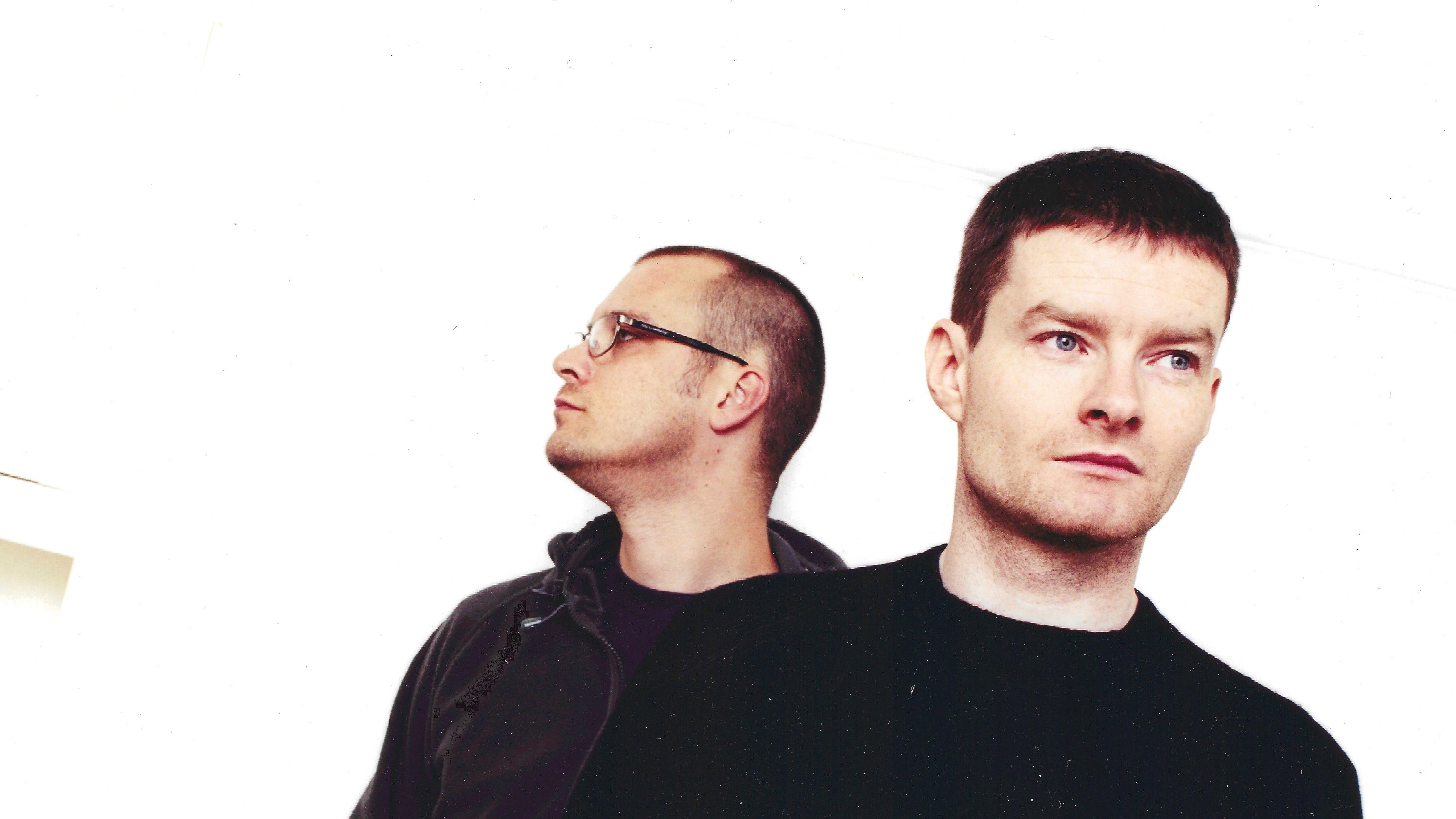

.jpg)
